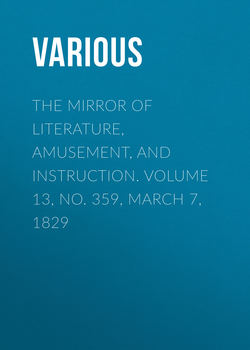Читать книгу The Mirror of Literature, Amusement, and Instruction. Volume 13, No. 359, March 7, 1829 - Various - Страница 2
CHOICE HINTS FOR A PLAN TO DISCHARGE THE NATIONAL DEBT
Оглавление(For the Mirror.)
"Great events sometimes spring from trivial causes," of the truth of this adage, no man is, I think, so great a heretic, as to express any doubt—were such the case, it would be by no means difficult to conjure up a host of evidence, in support of our proposition; but, seeing that "such things are," let us at once to the point.
The present age is so rife in whims and proposals, that I am rather apprehensive, some may doubt the feasibility of the following. Nevertheless, it is, methinks, quite as good, as many others which recently were strangled, in struggling for existence.
In looking over some old pamphlets the other day, I met with the following "true and particular account" of Mr. Peter Pounce, Postmaster, of Petersham, and his horse, Prance.
Now, according to my author (of whose veracity I entreat the reader to use his own discretion) it seems this Mr. Pounce was an exceedingly good kind of man, and that his horse, Prance, was also an exceedingly good kind of horse; moreover, when the postmaster travelled, he usually put up at the George, where there is exceeding good entertainment for both man and horse. Upon one occasion, being in great haste, Mr. Pounce directed the ostler not to put Prance into the stable, but to tie him to the brew-house door. Now, as cruel fate would have it, there was just within the nag's reach, a tub full of wine lees, which, luckless moment for him, (being thirsty) he unceremoniously quaffed off in a trice, without even here's to you.
The consequence was, Prance fell down dead drunk; nay, he acted death so much to the life, that his master, reckoning him absolutely defunct, had him flayed, and sold his skin to a tanner, who happened to be drinking in the alehouse kitchen. Mr. Pounce then walked in a solitary mood to his home, and communicated the melancholy affair to his good lady, who wept bitterly at Prance's untimely fate.
But leaving her to dry her eyes, we return to the nag—the weather being cold, he was by the loss of his skin, &c. quite sobered, and prudently trotted to his master's door, at which he whinnied with much clamour for admission.
Bless me, my dear, exclaims Mrs. P. our nag's ghost is at the door—I know him by his whinnies; upon which Mr. Pounce runs with alacrity to the door, and sure enough there he was—no ghost—but in propriâ personâ except his skin. In this exigence, the gentleman had four sheep killed forthwith, and covered the nag with a woollen garment. To make short of it, the horse rapidly recovered, and bore two tods of wool every year.
From this narration it is proposed to embrace the manifest advantages which offer themselves for improving the woollen trade—that great staple of Britain's wealth, in manner following:—
First, then, let an accurate estimate be taken of the number of sheep annually slaughtered in these kingdoms.
Secondly.—Let proper officers be appointed to collect these skins into commodious warehouses.
Lastly.—That such a number of horses, mares, and geldings as the said skins will conveniently cover, be flayed (without fear of Mr. Martin!) and their backs forthwith enveloped in fleece.
By this arrangement the following benefits will arise to the government and community:—
1. Every horse whose hide was formerly only useful after death, will then afford an annual profit by producing two tods of wool yearly, without any loss to the tanner or shoemaker, who will still necessarily have as many hides as heretofore.
2. The health of that useful animal the horse, which is probably liable to more disorders than any other (the human species excepted) will be much better preserved by woollen than a hairy covering.
3. There will be little occasion for saddles, &c. as the fleece will afford a very easy seat, much softer than leather, and well adapted for ladies and invalids.
Lastly.—There will be an annual acquisition of about 40 millions sterling, from this novel mode of procedure, of which please to accept the following algebraical demonstration:—
Let x be the unknown quantity; a, the horses; b, the sheep; then per simple equations x, plus a, plus b, minus tods, plus sheepskins, equal one thousand—then minus sheep, plus horses, minus wool, plus tods, equal one million. Lastly, horses plus sheep, minus hides, plus fleeces, in all equal forty millions.
Quod erat demonstrandum.
There, reader, if you are still a sceptic, I cannot help it.
JACOBUS.
